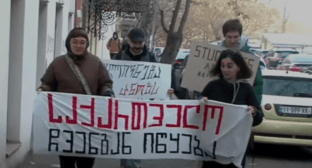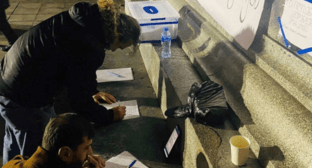20 December 2007, 20:35
Georgia: Government Used Excessive Force on Protesters
Government's Reputation as Human Rights Champion Damaged
Tbilisi, December 20, 2007
The Georgian government resorted to excessive force on November 7 when it violently dispersed demonstrators here in the country's capital and raided the private Imedi television station, Human Rights Watch said in a report released today.
Since the peaceful Rose Revolution in 2003, Western governments have hailed Georgia as an example of a successful transition to democracy and a human rights champion in the former Soviet Union. The November 7 violence exposed the government's shaky commitment to human rights and the rule of law.
"Our research clearly shows that the Georgian government crossed the line when police chased and beat peaceful demonstrators, and threatened and intimidated journalists," said Holly Cartner, Europe and Central Asia director at Human Rights Watch. "The November 7 police operations were not legitimate means of policing. They have done serious damage to Georgia's reputation as a champion of human rights."
The 102-page report, "Crossing the LineGeorgia's Violent Dispersal of Protestors and Raid on Imedi Television," is the most comprehensive account to date of the Georgian government's attacks on protestors and the raid on Imedi. Witnesses described in detail how police and other law enforcement agents violently dispersed protestors in four separate incidents on November 7.
The report also documents the heavily armed raid on and closure of Imedi television, which is partly owned by Rupert Murdoch's News Corporation. Hundreds of police intimidated and threatened Imedi staff before ejecting them from the studios and then destroying and damaging the station's equipment.
The November 7 police violence capped several days of peaceful demonstrations that had begun on November 2 in front of the Parliament on Rustaveli Avenue in central Tbilisi. Georgia's opposition parties were calling for parliamentary elections to be held in early 2008 and for the release of political prisoners. Many citizens who participated in the demonstrations complained of high unemployment and continuing poverty, as well as perceived government corruption.
Large crowds gathered at approximately 11 a.m. in response to calls by opposition leaders to protest an early morning police raid on demonstrators and hunger strikers who had spent the night on the steps of Parliament. The government called in riot police after demonstrators broke through one police line and filled Rustaveli Avenue. After briefly issuing warnings to disperse and using a water cannon against the front rows of demonstrators, riot police simultaneously launched a volley of teargas and rubber bullets into the crowd. Masked riot police and other forces then pursued the fleeing demonstrators, kicking and punching them, and striking them with truncheons, wooden poles, and other objects. Riot police used the same methods when crowds then gathered at Rike, a large open area several kilometers from the city center with no through streets.
Later that evening, hundreds of special forces troops armed with machine guns and other weapons entered the Imedi television studios. They forced journalists and other staff members to the floor and pointed guns at their heads. They forced Imedi off the air, after news anchors managed to describe the raid to viewers in the final minutes of broadcasting. The Imedi staff was evicted, and troops damaged or destroyed much of the station's equipment. The staff and its supporters who had gathered outside of the gate were then set upon again by riot police firing teargas and rubber bullets and attacking individuals with truncheons.
Imedi began broadcasting again in mid-December, after a month of intense negotiations between the government and News Corporation. Senior Imedi officials claim much of the equipment was destroyed or missing.
The Georgian government claims that, in dispersing the protests and closing Imedi, it was responding to threats of massive public disorder and a coup d'etat supported by Russian counter-intelligence and the exiled businessman Badri Patarkatsishvili, who has financed the opposition and was the founder and part-owner of Imedi.
"Whether or not the Georgian government was facing the threat of a coup, the authorities still have the obligation to respect basic human rights and to ensure that police respond to protests in a lawful and proportionate manner," said Cartner. "The government's response to any perceived threat posed by Imedi was clearly excessive and a violation of freedom of expression."
Late in the evening on November 7, the government declared a state of emergency, which was lifted eight days later. To help diffuse the political crisis, President Mikheil Saakashvili on November 8 called early presidential elections to be held on January 5, 2008. In accordance with the election laws, Saakashvili stepped down on November 25 in advance of the elections. Saakashvili and eight others, including Patarkatsishvili, will vie for the presidency.
"No matter who wins the upcoming presidential elections, Georgia has a lot of work to do to ensure accountability for the serious abuses that took place on November 7," said Cartner. "The re-opening of Imedi is a welcome step, but the government must also investigate and prosecute the crimes committed by law enforcement. Only then can the government count on public trust and support."
Georgia's international partners, including most prominently the United States and the European Union, have provided unwavering support for President Saakashvili and his government since it came to power in the Rose Revolution. Western governments have been reluctant to publicly criticize the Georgian government, giving credence to the government's repeatedly stated good intentions and promises of reform.
"Even before November 7, there were serious signs that the Georgian government was actually undermining the rule of law and human rights principles it had espoused during the Rose Revolution," said Cartner. "It's high time for the US and EU to confront Georgia on its shaky human rights record and insist on accountability for the November 7 events."
"Crossing the Line: Georgia's Violent Dispersal of Protestors and Raid on Imedi Television" is available at: http://hrw.org/reports/2007/georgia1207/
: "Zakareishvili: events on November 7 in Georgia have moved the journalist phenomenon to the forefront."
January 11, 2025 23:55
-
Rights defender Safarov links his arrest with US State Department's Award
Rufat Safarov, an Azeri human rights defender, has stated that before his arrest, he faced demands to publicly refuse the US State Department's Award.
January 11, 2025 22:57
-
Contract soldier complains about absence of treatment at hospital in Chechnya
Ruslan Arazov, a wounded soldier, has stated that he was discharged from a hospital in Chechnya, although he received no proper treatment there. He has demanded to conduct a check and punish those guilty.
January 11, 2025 21:28
-
Torture case of detainee by law enforcers in Malgobek reaches court
The case opened against the policemen from the city of Malgobek, accused of torturing a detainee and receiving a bribe in the form of an apartment, has been transferred to the court.
January 11, 2025 20:59
-
Human rights defenders: Zaira Pirova, who ran away from home, faces danger in Georgia
Georgia has ceased to be a safe country for the women who run away from the North Caucasus due to a change in the country’s political course and the accessibility of the country for Russian citizens. It is still risky for Zaira Pirova to return to Dagestan.
January 11, 2025 20:53
-
Social media users argue about Zaira Pirova’s escape to Georgia
The family should accept the choice of Dagestani native Zaira Pirova and stop searching for her in Georgia, social media users note. Their opponents demanded that the girl should be returned to her family.
-
January 09, 2025 23:17

Lawyers: court in Chechnya violates Musaeva’s right to defence
-
January 09, 2025 22:56

In Tbilisi, students of seven universities demand to hold new parliamentary elections
-
January 09, 2025 22:46

Family of escaped Dagestani Zaira Pirova offers her to return home
-
January 09, 2025 21:14

Near Georgian Parliament Participants protesters collect letters to detained comrades
-
January 08, 2025 23:34

Rights defenders refute abduction version of Dagestani Zaira Pirova
-
January 09, 2025 23:17
Lawyers: court in Chechnya violates Musaeva’s right to defence
-
January 09, 2025 22:56
In Tbilisi, students of seven universities demand to hold new parliamentary elections
-
January 09, 2025 22:46
Family of escaped Dagestani Zaira Pirova offers her to return home
-
January 09, 2025 21:14
Near Georgian Parliament Participants protesters collect letters to detained comrades
-
January 08, 2025 23:34
Rights defenders refute abduction version of Dagestani Zaira Pirova
-
January 11, 2025 23:55
Rights defender Safarov links his arrest with US State Department's Award -
January 11, 2025 22:57
Contract soldier complains about absence of treatment at hospital in Chechnya -
January 11, 2025 21:28
Torture case of detainee by law enforcers in Malgobek reaches court -
January 11, 2025 20:59
Human rights defenders: Zaira Pirova, who ran away from home, faces danger in Georgia -
January 11, 2025 20:53
Social media users argue about Zaira Pirova’s escape to Georgia -
January 10, 2025 21:45
Resident of Stavropol Territory convicted of repeated discrediting Russian Army -
January 10, 2025 21:44
Azerbaijani activist Rail Abbasov sentenced to freedom deprivation -
January 10, 2025 20:43
Kadyrov demands to tighten fight against tinted car windows -
January 09, 2025 23:17
Lawyers: court in Chechnya violates Musaeva’s right to defence -
January 09, 2025 22:56
In Tbilisi, students of seven universities demand to hold new parliamentary elections